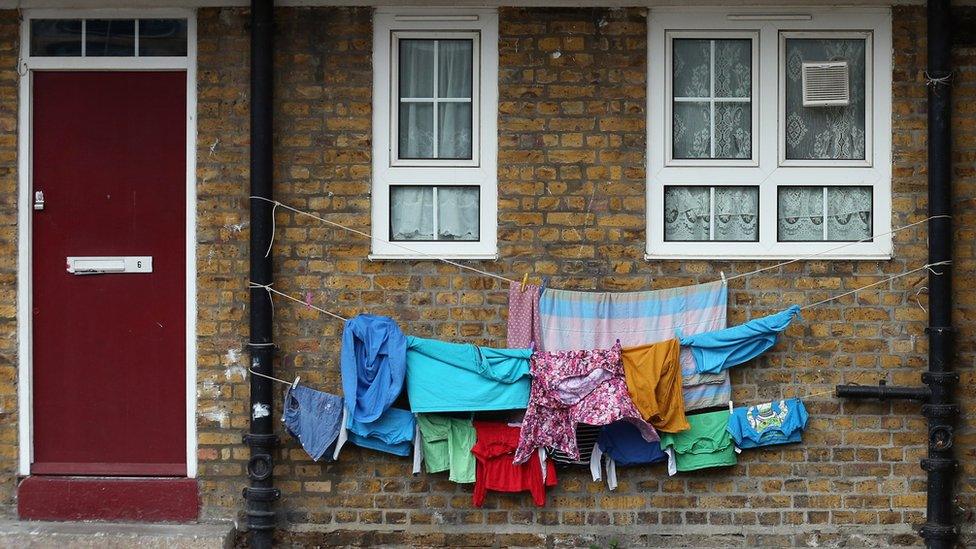More than 103,000 children 'homeless at Christmas' in England
- Published
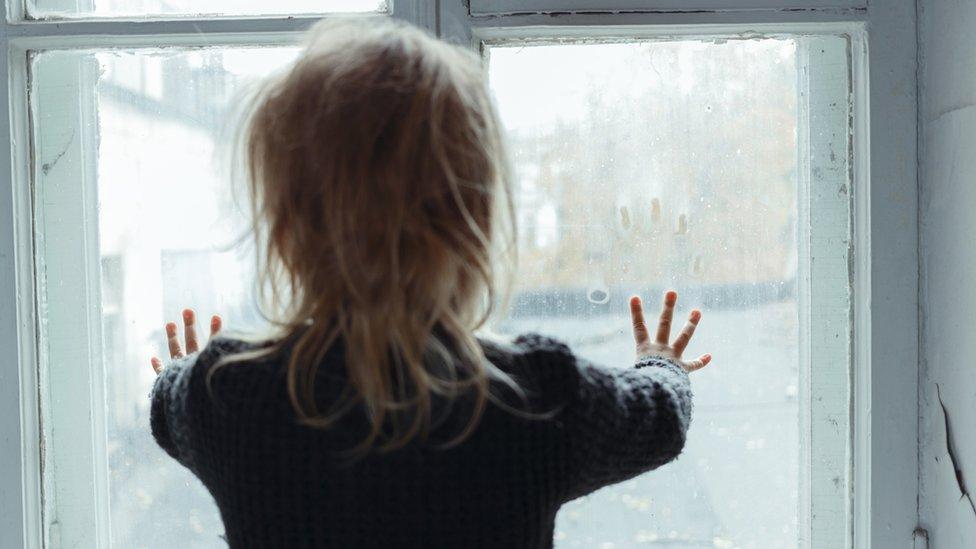
Shelter says 109,000 children in Britain face Christmas without a permanent home - the vast majority of them in England
The number of children spending Christmas in temporary accommodation in England has reached a seven-year high, the housing charity Shelter has said.
New figures show there were 14,670 households accepted as homeless between July and September, the largest number since 2008.
According to Shelter, more than 103,000 children will spend Christmas in B&Bs, hostels or temporary rented homes.
Ministers said the figures were still half the 2003 and 2004 peak.
Department for Communities and Local Government statistics, external show there were 68,560 families in temporary housing from July to September this year, compared with 60,900 in the same three months of 2014.
And 53,480 of those were households with children, compared with 45,590 at the same time the year before.
Shelter said a quarter of all homeless households living in temporary accommodation in England had been moved away to another council area.
The figures showed 18,600 homeless households moved to another area, more than three times as many as in 2010.

Analysis: Judith Burns, Education and Family Reporter
Families in temporary accommodation outside their local areas are under particular strain, according to Shelter.
They are "uprooted and moved away from jobs, schools and support networks with no idea when, or even if, they will be able to return", says chief executive Campbell Robb.
But four in ten homeless households in temporary accommodation find themselves in this position, the latest figures show.
This is more than three times the figure for the same period in 2010 when 5,880 households were in temporary accommodation in another local authority area.
Families in bed and breakfast hotels who have to share kitchens and bathrooms often rely on kitchen facilities of relatives or friends to cook healthy food, a Shelter researcher explained.
One woman, offered temporary accommodation in a city hundreds of miles from home, turned it down as she would have lost her job and her children would have been forced to change schools.
Frequent changes of school and long journeys can be very disrupting for children, the researcher added.
Councils are finding it far harder to find homeless households local accommodation due to "a severe drought of affordable homes and drastic cuts to council budgets", Mr Robb added.
The problem is particularly acute in London where one in three families in temporary accommodation are outside their original areas.

Communities Minister Marcus Jones said: "We are committed to helping the most vulnerable people in our society. The protection of the Homelessness Prevention Grant in the Local Government Finance Settlement shows our continued commitment to tackling homelessness.
"Statutory homelessness acceptances are now less than half the 2003 to 2004 peak but we are determined to ensure that anybody who needs help gets it.
"We have made over £500m available since 2010, which has prevented nearly a million people becoming homeless. We are committed to build on this over the next four years and work with the sector to do all we can to prevent homelessness."
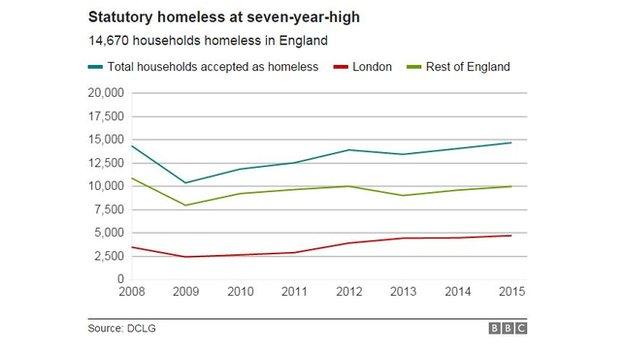
Statutory homelessness
New measures include protecting homelessness prevention for local authorities and £40m from the Department of Health to refurbish hostels and provide low cost shared accommodation for young people. There will also be £30m extra for councils' homelessness budgets and a £5m fund for the 25 local authorities facing the greatest pressures moving people from temporary to settled homes.
The councils sharing the funding are: Barking and Dagenham, Barnet, Birmingham, Brent, Bromley, Brighton and Hove, Croydon, Ealing, Enfield, Hackney, Hammersmith and Fulham, Haringey, Hounslow , Islington, Kensington and Chelsea, Lambeth, Lewisham, Luton, Newham, Redbridge, Southwark, Tower Hamlets, Waltham Forest, Wandsworth and Westminster
'Dingy hostel room'
Shelter said the figures meant 109,000 children in England, Scotland and Wales would be in a hostel or temporary accommodation on 25 December, 103,430 of them in England.
Chief executive of Shelter, Campbell Robb, said: "These figures are a heart-breaking reminder that thousands of families will wake up homeless this Christmas morning - many hidden away in a cramped and dingy B&B or hostel room, sometimes miles away from everyone and everything they know.
"With the double blow of cuts to welfare and a chronic lack of affordable housing, many more families are facing a desperate battle to keep a roof over their heads.
"Our advisors will be working non-stop to support the 109,000 children who'll be homeless this Christmas, but we're struggling to keep up with demand. That's why we urgently need more support from the public to help us make sure that no-one is left to fight bad housing or homelessness on their own."
A spokesman for the Local Government Association said councils finding it difficult to house homeless people because of a shortage of affordable homes and funding pressures.
He added: "It is important that councils have the funding and flexibilities to help those who find themselves homeless or at risk of homelessness. Local authorities also need the power to invest in building more homes that local communities can genuinely afford."
A person is considered "statutorily homeless" by the government if they no longer have a legal right to occupy their accommodation or if it would no longer be reasonable to live there, for example if it would lead to violence against them.
Other reasons included no longer being able to stay with family or friends, relationship breakdown and mortgage arrears leading to repossession.
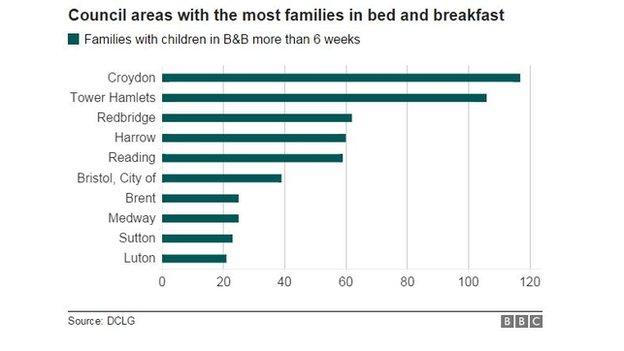
Areas with the most families in bed and breakfast
- Published24 September 2015
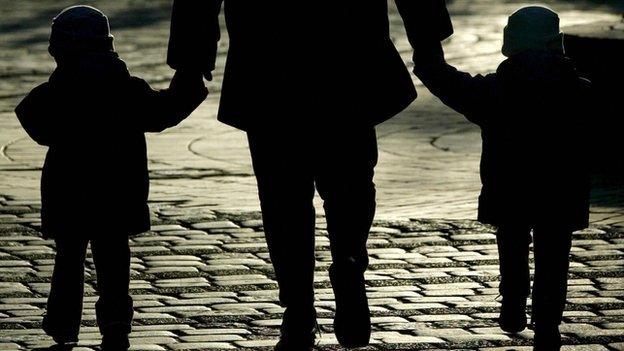
- Published15 December 2015
